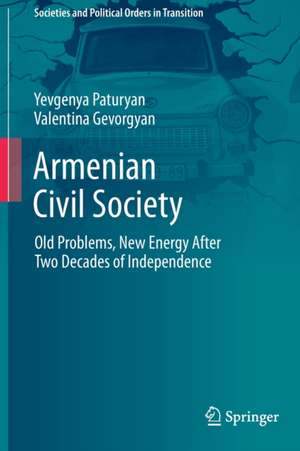Armenian Civil Society: Old Problems, New Energy After Two Decades of Independence: Societies and Political Orders in Transition
Autor Yevgenya Paturyan, Valentina Gevorgyanen Limba Engleză Paperback – 13 dec 2021
| Toate formatele și edițiile | Preț | Express |
|---|---|---|
| Paperback (1) | 722.12 lei 6-8 săpt. | |
| Springer International Publishing – 13 dec 2021 | 722.12 lei 6-8 săpt. | |
| Hardback (1) | 728.11 lei 6-8 săpt. | |
| Springer International Publishing – 12 dec 2020 | 728.11 lei 6-8 săpt. |
Din seria Societies and Political Orders in Transition
- 20%
 Preț: 1384.59 lei
Preț: 1384.59 lei - 24%
 Preț: 572.26 lei
Preț: 572.26 lei - 18%
 Preț: 783.35 lei
Preț: 783.35 lei - 18%
 Preț: 1012.84 lei
Preț: 1012.84 lei - 18%
 Preț: 957.62 lei
Preț: 957.62 lei - 18%
 Preț: 961.72 lei
Preț: 961.72 lei - 15%
 Preț: 641.03 lei
Preț: 641.03 lei - 15%
 Preț: 647.92 lei
Preț: 647.92 lei - 15%
 Preț: 697.47 lei
Preț: 697.47 lei - 15%
 Preț: 653.33 lei
Preț: 653.33 lei - 15%
 Preț: 636.45 lei
Preț: 636.45 lei - 15%
 Preț: 696.18 lei
Preț: 696.18 lei - 15%
 Preț: 641.03 lei
Preț: 641.03 lei - 18%
 Preț: 781.31 lei
Preț: 781.31 lei - 5%
 Preț: 715.35 lei
Preț: 715.35 lei - 18%
 Preț: 723.56 lei
Preț: 723.56 lei - 18%
 Preț: 785.11 lei
Preț: 785.11 lei -
 Preț: 382.75 lei
Preț: 382.75 lei - 18%
 Preț: 784.13 lei
Preț: 784.13 lei - 18%
 Preț: 783.35 lei
Preț: 783.35 lei - 18%
 Preț: 730.47 lei
Preț: 730.47 lei
Preț: 722.12 lei
Preț vechi: 880.64 lei
-18% Nou
Puncte Express: 1083
Preț estimativ în valută:
138.18€ • 144.93$ • 115.03£
138.18€ • 144.93$ • 115.03£
Carte tipărită la comandă
Livrare economică 01-15 aprilie
Preluare comenzi: 021 569.72.76
Specificații
ISBN-13: 9783030632281
ISBN-10: 3030632288
Ilustrații: XI, 187 p. 14 illus.
Dimensiuni: 155 x 235 mm
Greutate: 0.29 kg
Ediția:1st ed. 2021
Editura: Springer International Publishing
Colecția Springer
Seria Societies and Political Orders in Transition
Locul publicării:Cham, Switzerland
ISBN-10: 3030632288
Ilustrații: XI, 187 p. 14 illus.
Dimensiuni: 155 x 235 mm
Greutate: 0.29 kg
Ediția:1st ed. 2021
Editura: Springer International Publishing
Colecția Springer
Seria Societies and Political Orders in Transition
Locul publicării:Cham, Switzerland
Cuprins
Introduction.- Civil Society in the Context of Post-Communist Democratisation Discourse.- Methodology of the Study.- Still Post-Communist? Testing Howard’s Predictions.- Armenian Civil Society: Explaining the Post-Communist Weakness.- The Generational Change in Armenia and Its Impact on Civil Society.- The Formal Domain of the Civil Society Ecosystem: Armenian NGO.- The Informal Domain of the Civil Society Ecosystem: Civic Initiatives.- Growing Complexity of the Civil Society Ecosystem.- Conclusion and Discussion.
Notă biografică
Yevgenya Jenny Paturyan is an Associate Professor of Political Science and International Affairs at the American University of Armenia and Assistant Director of the Turpanjian Center for Policy Analysis at the same university since 2011. Previously she worked at Caucasus Research Resources Centers, Armenia. She received her PhD in Political Science from Jacobs University Bremen, Germany in 2009. Her main academic interests are in civil society, volunteering, the democratization of post-communist countries, and corruption.
Valentina Gevorgyan is a PhD student of Political Science at the University of Fribourg, Switzerland and Civil Society Program Coordinator at Open Society Foundations, Armenia. Prior to that, she was a Senior Researcher at the Turpanjian Center for Policy Analysis, part of the American University of Armenia. Her academic interest focuses on the role of civil society in the development of public policy agenda and the promotion of human rights in hybrid regimes. Her doctoral research aims to provide a deeper understanding of the contemporary relationship between civil society and governmental institutions in Armenia.
Textul de pe ultima copertă
This book analyzes Armenian civil society in the context of post-communist democratization. It explores persistent challenges to civic engagement under Armenia’s semi-authoritarian regime, and also highlights success stories of public mobilization and social impact. Drawing on a broad range of methods and empirical sources, the book provides a comprehensive overview of the re-emerging diversity of Armenian civil society: from formal organizations to spontaneous activism. It combines a country-level analysis of broad patterns in the country’s political culture with the life stories of individual agents of change, contrasting public apathy with young activists’ enthusiasm. By exploring mobilization strategies and narratives in Armenian civil society, the book provides valuable new insights into the roots of the mass public uprising in spring 2018.
Caracteristici
Analyzes Armenian civil society in the context of post-communist democratization Highlights challenges to civic engagement in Armenia Tests the claim of the persistent weaknesses of post-communist civil societies Offers valuable new insights into the roots of the mass public uprising in spring 2018
